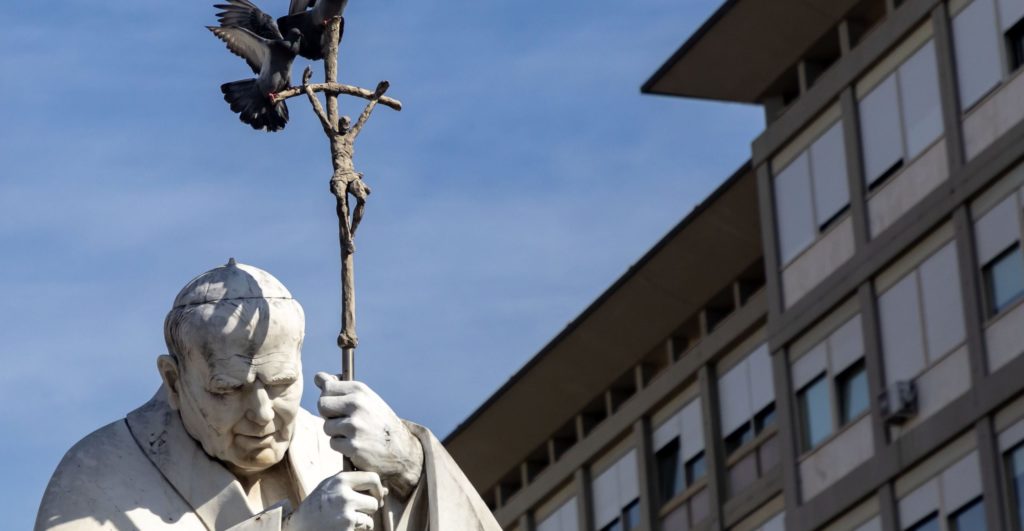ROME — In May 2003, fans of the popular television series “The West Wing” were taken for a wild ride when, during the season four finale, President Josiah Bartlet invoked the United States Constitution’s 25th Amendment when his youngest daughter was kidnapped.
The 25th Amendment deals with presidential succession and disability, outlining, among other things, what happens if a sitting president were to die, resign, or be removed from office by impeachment.
It also provides for the temporary transfer of the sitting president’s duties and powers to the vice president, either on the president’s own initiative or on the initiative of the vice president acting in conjunction with the majority of the president’s cabinet.
The “what ifs” of such scenarios have been explored by “The West Wing,” and more recently, the TV series “Madam Secretary.”
But with Pope Francis recently hospitalized with a serious respiratory infection and double pneumonia, the question can naturally be applied to the papacy: What would happen to the Catholic Church if a pope were to be incapacitated in some way?
Unlike most governments, the Catholic Church has no “No. 2” official or “vice pope” designated to step in if a pope becomes incapacitated and unable to perform his duties.
At an administrative level, the secretariat of state would work with the Vatican City’s governorate and the dicasteries of the Roman Curia would keep things running, but decisions would simply cease to be made.
Pope Francis has said that he’s signed a letter of resignation in the case that he becomes medically incapacitated and therefore unable to govern. But there is no clear instruction on who would enforce that letter, and when.
As of the moment, Francis is not incapacitated and continues to govern the Church from the Gemelli Hospital in Rome.
St. Pope John Paul II, who was shot in 1981 and suffered from Parkinson’s in the latter half of his pontificate, spent seven different stints at Gemelli in his nearly 27-year papacy. Each time, decisions were made, documents were signed, and appointments and nominations were carried out from the hospital.
Some have argued that by his final hospitalizations, John Paul had ceased to be directly involved in day-to-day government due to the debilitating nature of his illness. But that is not the case with Francis, who continues to be very much in charge despite his current limitations.
Complicating the comparisons with past papal health scares is the fact that 2025 is a jubilee year, something that only happens every 25 years. That makes for an even more packed calendar than usual, with the pope expected to preside at special Masses for the various groups and categories being celebrated on any given week. That’s on top of his regular weekly Wednesday public audience, Sunday Angelus addresses, and other routine meetings and events.
February’s hospital stay forced the pope to delegate certain public tasks to senior officials: Cardinal José Tolentino de Mendonça, prefect of the Dicastery for Culture and Education, celebrated his Feb. 16 Mass for the Jubilee for Artists and the World of Culture, while Archbishop Rino Fisichella of the Dicastery for Evangelization led the Mass for the Jubilee of Deacons a week later.
But in reality, Francis has already modified his activities over the past few years to accommodate his weakening health, including his chronic sciatica. It’s now normal for aides to celebrate Masses at St. Peter’s main altar while he sits in a chair off to the side, and for assistants to read his speeches when he is too winded to do so himself.
But as of now, the reins of Church government remain very much in the 88-year-old pope’s own hands.
If his condition improves and he can return to the Vatican, this latest episode will likely result in an even more modified schedule.
This would be particularly challenging for a pope during a jubilee year, with a swath of extra commitments and with Lenten and Easter activities coming up. But an aging Francis has found ways to adapt before, so further adjustments to his way of doing business are not unrealistic.
What all this leaves hanging is the question of what might happen if a pope were truly to become incapacitated, not just for a couple of weeks but a prolonged period. For now, that’s still a question for another day.

